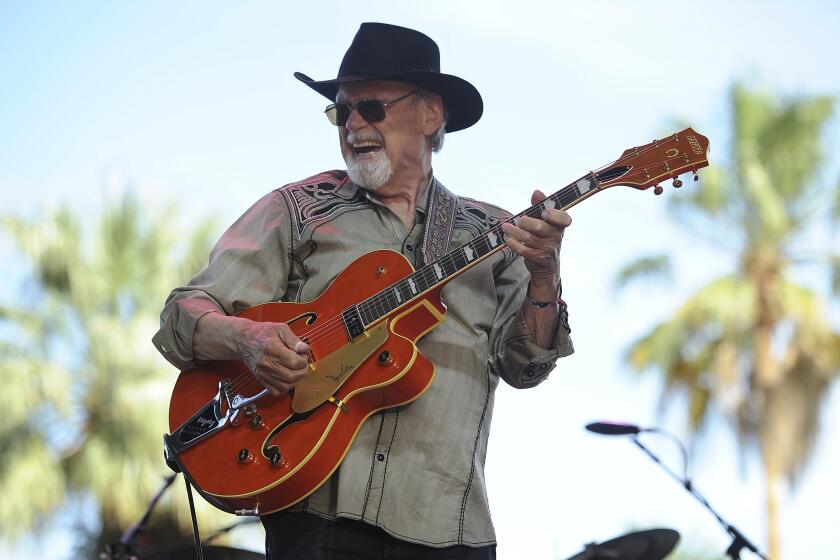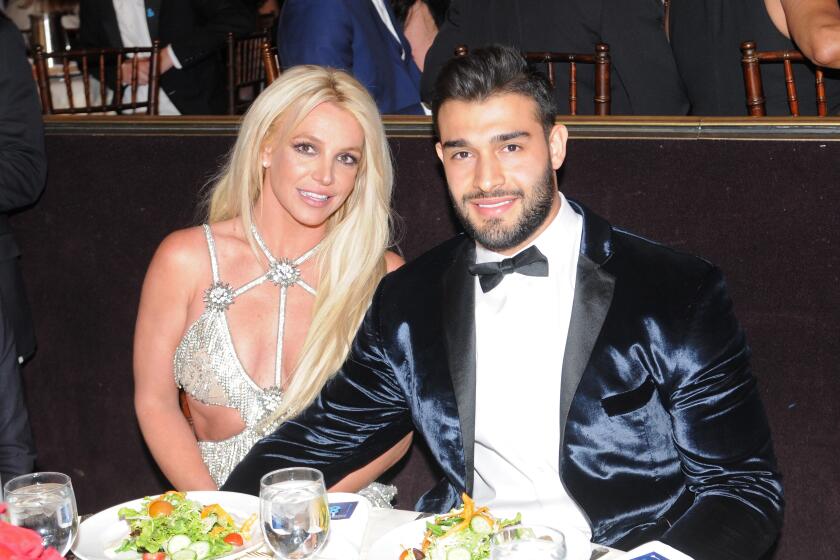Time Warner to Abandon Gangsta Rap
Succumbing to months of pressure from Senate Majority Leader Bob Dole and media watchdogs, Time Warner Inc. decided Wednesday to get out of the gangsta rap business.
The New York media giant announced it will unload its $115-million stake in the successful but controversial Westwood-based Interscope Records, home to such award-winning rap stars as Snoop Doggy Dogg and Dr. Dre.
Time Warner executives denied that the firm was bowing to political pressure, blaming the split on contractual provisions that prevented the company from monitoring the content of Interscope’s recordings.
Rap critics hailed the decision as a direct response to their attack on Interscope, a firm they accuse of releasing rap songs that degrade women and glorify violence.
“As I declared in Hollywood last May and have repeated across the country, shame is a powerful weapon--and Time Warner has felt the sting of shame,” Dole said. “Parents and concerned citizens spoke out and now we’re seeing real results.”
The nation’s former drug czar William J. Bennett said: “Let this be a warning to all the other big entertainment companies.”
Bennett and C. Delores Tucker, chairwoman of the National Political Congress of Black Women, launched a highly public anti-rap campaign in May to force Time Warner’s hand.
While rap critics rejoiced, Time Warner’s decision to sever ties with Interscope will have no immediate effect on the music available in record stores. Interscope will either distribute its upcoming albums independently or link up with another major corporation.
This is the second time in three years that pressure over rap music has jolted Time Warner, which on Friday agreed to a merger with Turner Broadcasting System Inc. that will make it the largest entertainment company in the world. The company stopped distributing rapper Ice-T’s “Cop Killer” in 1992 just two months after police groups picketed the firm’s shareholders’ meeting. Ice-T left the label soon after, triggering an exodus of gangsta rappers from other Time Warner-affiliated labels.
“It’s a sad day for Warner,” said Ice-T, who now runs his own record company. “Warner has always been considered the biggest outlet for free speech. These special interest groups won’t stop the music though. Rap and hip-hop will still be around long after the presidential race is over, long after all the politicians crawl back into their holes.”
While selling Interscope may temporarily insulate Time Warner from rap critics, it could pose long-term problems with artists. Indeed, executives at rival labels said privately that they plan to capitalize on the divorce to discourage new performers from joining Time Warner.
“Would I use what Time Warner just did against them in a bidding war to sign an artist? You bet I would,” said a senior executive at one competing music conglomerate. “In fact, I already have.”
Other record companies may be less susceptible than Time Warner--whose cable television interests are subject to government regulation--to public criticism over lyrics.
All five of Time Warner’s major rivals profit from a variety of rap and rock acts whose music would almost certainly offend church groups, family organizations and politicians. The difference, executives say, is that none of those corporations are involved in cable and all of them--unlike Time Warner--are foreign-owned and less accountable to American stockholders.
“I don’t feel like we’re bowing to political pressure,” said Michael Fuchs, chairman and CEO of the Warner Music Group. “We’re just facing the reality of the kind of pressures that can get put on a big company. If music is being distributed in our name, we must bear the responsibility for that music. The nature of our agreement with Interscope precluded us from any meaningful involvement or discussion regarding Interscope’s music.”
Interscope, which distributes explicit rap and rock music by the much-maligned Death Row and Nothing Records labels, has been affiliated with Time Warner since it opened for business in late 1990.
Time Warner initially invested about $15 million in the firm, which has sold more than $350 million in albums in the United States over the last three years. Interscope has the No. 1 record on the nation’s new artist chart--Deep Blue Something’s “Home”--plus five albums in this week’s Top 100.
Headed by Jimmy Iovine and Ted Field, Interscope has forged a reputation in the industry as a creative risk-taker, pushing the boundaries of mainstream pop and transforming controversial but acclaimed underground rap and rock artists like Dr. Dre and Nine Inch Nails into MTV stars and Grammy-winning, multimillion-sellers.
As recently as March, according to sources, Time Warner Chairman Gerald Levin pledged support for Interscope’s cutting-edge philosophy in a meeting with Iovine and agreed to pay $100 million to raise Time Warner’s equity stake in the company to 50%.
But Levin’s attitude toward Interscope ch a nged dramatically after Bennett and Tucker criticized the firm at Time Warner’s annual shareholder meeting in May. Dole and other politicians immediately jumped on the anti-Time Warner wagon, echoing Bennett and Tucker’s criticisms.
Some members of Time Warner’s board of directors also began demanding that the firm cut ties with Interscope, as did New York state Comptroller Carl McCall, trustee of a huge pension fund that holds Time Warner stock. Last week, two Pennsylvania lawmakers urged the state’s pension boards to withdraw $550 million in stock from Time Warner by Saturday if the company failed to cut ties with Interscope.
Pressure on the conglomerate escalated as Interscope prepared to release “Dogg Food,” the debut album by Tha Dogg Pound, a Death Row rap duo whose songs are rife with potentially offensive lyrics.
Initially, Fuchs, who took charge of the music group in May a few days before the rap ruckus broke out, asked that the album be delayed. He then asked to preview its lyrics and was eventually granted access to them. Sources said Fuchs, the chairman of Home Box Office, who earned a reputation in the television community as a free-speech defender, was uncomfortable with the lyrics.
Sources said Fuchs was also critical of the financial terms of Interscope’s contract. Representatives from both companies refused to discuss details of the deal, but sources said Interscope will pay Time Warner an estimated $115 million over the next three years to buy back Time Warner’s 50% investment in the label--with more than $50 million due by January.
Sources said PolyGram and Sony Music are each eager to buy an interest in Interscope to bolster their domestic market share. Iovine and Field, however, are said to be weary of corporate politics and are exploring the possibility of forming their own independent distribution company.
Time Warner will continue to distribute rap artists on some of its labels, but not hard-core gangsta rappers that it cannot monitor.
Competitors wondered Wednesday whether Time Warner may be pressured to abandon controversial rap and rock artists distributed on its other labels, including Tommy Boy Records, Atlantic and Elektra.
Questions also remain as to whether Warner Chappell, Time Warner’s music publishing division, plans to back out of a recently signed, multimillion-dollar publishing deal with rap entrepreneur Suge Knight, the chairman of Interscope-distributed Death Row Records.
The company has paid Knight a multimillion-dollar advance to secure the right to distribute songs signed to his Suge Publishing company for the next five years.
More to Read
The biggest entertainment stories
Get our big stories about Hollywood, film, television, music, arts, culture and more right in your inbox as soon as they publish.
You may occasionally receive promotional content from the Los Angeles Times.






